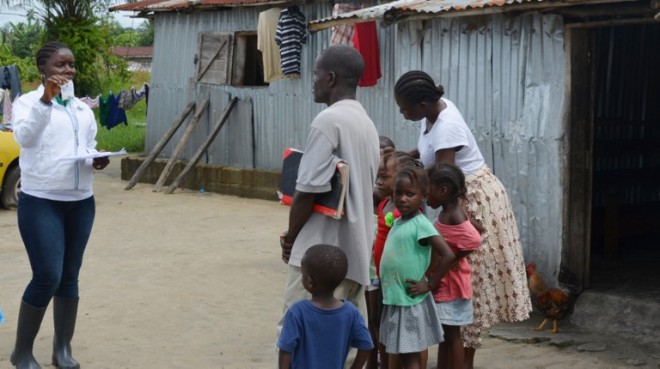
A member of the NGO U Foundation give medication to quarantined family members suffering from the Ebola virus on October 16, 2014 in Monrovia. AFP
BUCHANAN — It should be every child’s dream: with the sun blazing on a sweltering afternoon exams are off, lessons have been cancelled and school’s out for the summer — and possibly the rest of the year.
But the opposite is true for Ebola-hit Liberia’s children, so bored after months of school closures that they actually visit their teacherless classrooms every day to meet friends.
It is midday in Buchanan, a port of 35,000 people 110 kilometers (70 miles) southeast of the capital Monrovia, and Prince David is waking from a nap on the veranda outside his empty classroom.
“I have nothing to do so I came here to wait for some friends. Every morning my mother gives me jobs to do at home and when I get through I come onto campus to meet friends so we can (chat),” he says.
“That’s how we kill the time.”
The 13-year-old and his friends probably felt a pang of excitement when the government, hit by the worst Ebola epidemic on record, shut Bassa High and every other school in the country in June.
Now, says the sixth grader, it’s all just getting a little bit boring.
“Really, I am tired sitting here every day while students in other parts of the world are going to school,” he tells AFP.
“I think this is not fair to us. In school they tell us that every child has the right to learn but we are not learning.”
Schools across Liberia were given hope on Thursday when the three-month state-of-emergency which closed their classrooms was lifted, but there was no word on when pupils would be allowed back to lessons.
Classrooms will reopen “at the time that will be decided by the progress that we make in this fight”, President Ellen Johnson Sirleaf said, with local authorities consulted and pupils enlisted in cleaning up neglected premises.
Liberia is estimated to have at least 1.5 million school aged children.
Praying Ebola leaves
It’s not just school that was cancelled under the state of emergency — the government outlawed almost all non-essential public gathering, and Buchanan has hardly been a playground recently.
“I am not blaming the government but it is not just fair. We cannot go to school, we cannot play football, no sports, nothing. It is not fair,” a glum Prince notes.
Exactly which restrictions, if any, are lifted remains to be seen, but for now teenagers wander the streets looking for anything to do in lieu of any announcement of a relaxation in the regulations.
Prince’s classmates Hawa Sherrif, 12, and Musu David, 14, sell oranges nearby — partly because they need the money, they say, but also just to get out of the house.
“We can’t just be sitting home every day doing nothing. When we sell oranges, whatever we realize will help our parents pay our school fees when school opens,” says Hawa.
Prince’s mother, Anita, tries to occupy her son with chores but it is never long before he is finished and heading out the door.
“Let us just pray that Ebola leaves Liberia soon, otherwise we will lose our kids to the street,” she says.
Named after Thomas Buchanan, the first governor of Liberia and a cousin of United States president James Buchanan, Liberia’s second city is dotted with beaches and lagoons.
It is the port for a 250 kilometer railway that brings iron ore from the northeastern mines of Nimba County by ArcelorMittal, the world’s largest steel producer.
Before Ebola, the streets thronged with nightlife and the constant rattle of brashly-painted vehicles arriving for business or pleasure from Monrovia.
Forgotten school work
Today the clubs and bars are nearly all shut, and while the port remains open and commercial activity still goes on during the day, the streets empty as a night time curfew kicks in.
Children meander aimlessly in small groups, avoiding physical contact and no longer greeting friends with the familiar Liberian handshake, with its characteristic finger snap.
Bassa High is the largest secondary school in Buchanan, with more than 1,000 students.
“The situation we find ourselves in now is disheartening. The government has closed schools down to avoid the spread of the virus. This has so many negative consequences on our school age children,” says the principal, Vee Moillaoh Sherrif.
The new academic year should have started on September 1 and Sherrif says he too has no idea when classes will resume.
So he goes to his school every day and tries to impress upon the children loitering outside that they should be using this time to revise the lessons of last term he fears many have long forgotten.
“What we do now is that we keep talking to our students who come around to find out when we will open,” he says.
“We tell them that though it is true that we fight Ebola, they should not forget to be going over their lessons when they have the chance.”
RELATED STORIES
State of emergency declared in Liberia over Ebola outbreak
New Ebola cases slowing in Liberia, but too soon to celebrate—WHO